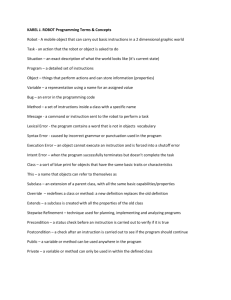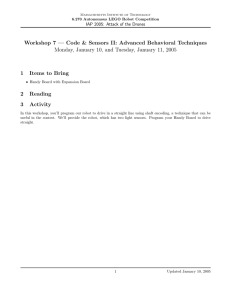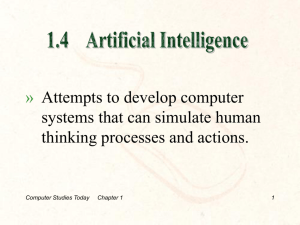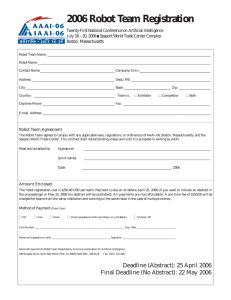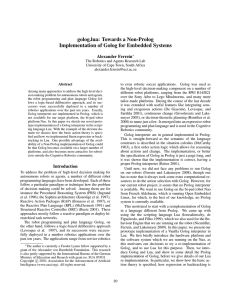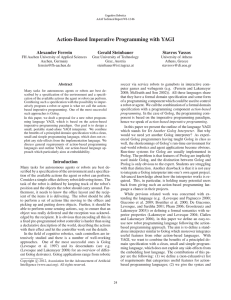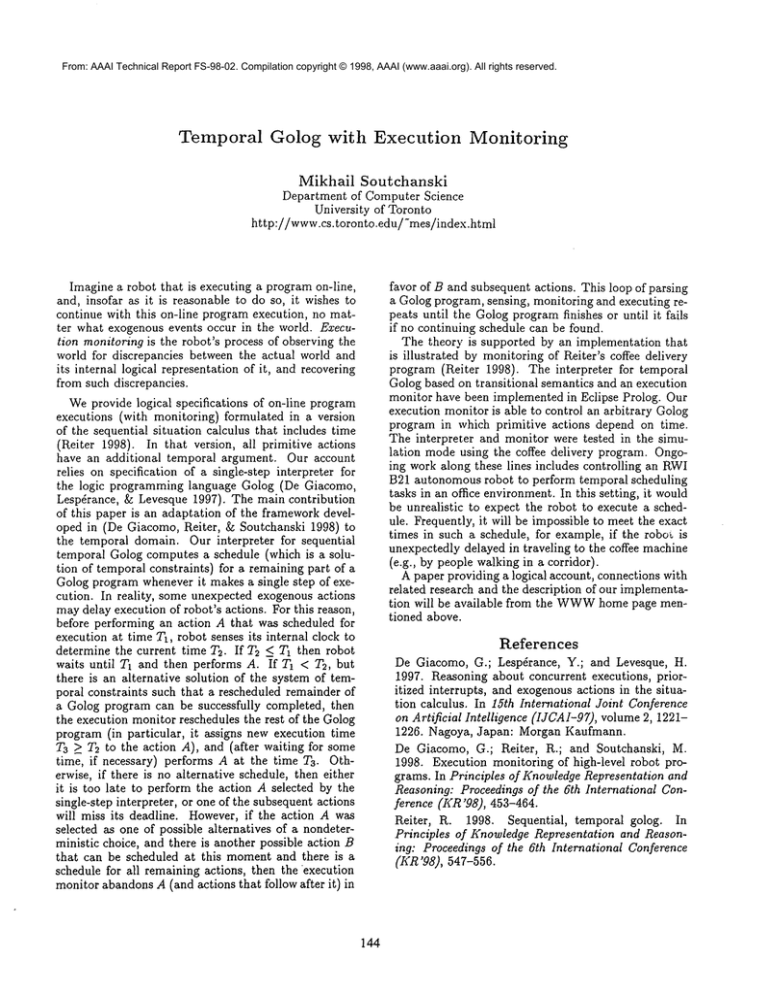
From: AAAI Technical Report FS-98-02. Compilation copyright © 1998, AAAI (www.aaai.org). All rights reserved.
Temporal Golog with Execution
Monitoring
Mikhail
Soutchanski
Department of Computer Science
University of Toronto
http://www.cs.toronto.edu/-mes/index.html
Imagine a robot that is executing a program on-line,
and, insofar as it is reasonable to do so, it wishes to
continue with this on-line program execution, no matter what exogenous events occur in the world. Execution monitoring is the robot’s process of observing the
world for discrepancies between the actual world and
its internal logical representation of it, and recovering
from such discrepancies.
favor of B and subsequent actions. This loop of parsing
a Golog program, sensing, monitoring and executing repeats until the Gologprogram finishes or until it fails
if no continuing schedule can be found.
The theory is supported by an implementation that
is illustrated by monitoring of Reiter’s coffee delivery
program (Reiter 1998). The interpreter
for temporal
Golog based on transitional semantics and an execution
monitor have been implemented in Eclipse Prolog. Our
execution monitor is able to control an arbitrary Golog
program in which primitive actions depend on time.
The interpreter and monitor were tested in the simulation mode using the coffee delivery program. Ongoing work along these lines includes controlling an I%WI
B21 autonomous robot to perform temporal scheduling
tasks in an office environment. In this setting, it would
be unrealistic to expect the robot to execute a schedule. Frequently, it will be impossible to meet the exact
times in such a schedule, for example, if the robo~o is
unexpectedly delayed in traveling to the coffee machine
(e.g., by people walking in a corridor).
A paper providing a logical account, connections with
related research and the description of our implementation will be available from the WWW
home page mentioned above.
Weprovide logical specifications of on-line program
executions (with monitoring) formulated in a version
of the sequential situation calculus that includes time
(Reiter 1998). In that version, all primitive actions
have an additional temporal argument. Our account
relies on specification of a single-step interpreter for
the logic programming language Golog (De Giacomo,
Lesp~rance, & Levesque 1997). The main contribution
of this paper is an adaptation of the frameworkdeveloped in (De Giacomo, Reiter, & Soutchanski 1998)
the temporal domain. Our interpreter for sequential
temporal Golog computes a schedule (which is a solution of temporal constraints) for a remaining part of
Golog program whenever it makes a single step of execution. In reality, some unexpected exogenous actions
maydelay execution of robot’s actions. For this reason,
before performing an action A that was scheduled for
execution at time Tt, robot senses its internal clock to
determine the current time :/’2. If T2 _< T1 then robot
waits until T1 and then performs A. If T1 < T2, but
there is an alternative solution of the system of temporal constraints such that a rescheduled remainder of
a Golog program can be successfully completed, then
the execution monitor reschedules the rest of the Golog
program (in particular, it assigns new execution time
T3 _> T2 to the action A), and (after waiting for some
time, if necessary) performs A at the time Ta. Otherwise, if there is no alternative schedule, then either
it is too late to perform the action A selected by the
single-step interpreter, or one of the subsequent actions
will miss its deadline. However, if the action A was
selected as one of possible alternatives of a nondeterministic choice, and there is another possible action B
that can be scheduled at this momentand there is a
schedule for all remaining actions, then the execution
monitor abandonsA (and actions that follow after it)
References
De Giacomo, G.; Lespdrance, Y.; and Levesque, H.
1997. Reasoning about concurrent executions, prioritized interrupts, and exogenous actions in the situation calculus. In 15th International Joint Conference
on Artificial Intelligence (IJCAI-97), volume2, 12211226. Nagoya, Japan: Morgan Kaufmann.
De Giacomo, G.; Reiter, R.; and Soutchanski, M.
1998. Execution monitoring of high-level robot programs. In Principles of KnowledgeRepresentation and
Reasoning: Proceedings of the 6th International Conference (KR’98), 453-464.
Reiter, R. 1998. Sequential,
temporal golog. In
Principles of Knowledge Representation and Reasoning: Proceedings of the 6th International Conference
(KR’gS), 547-556.
144


